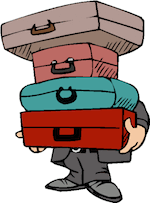What do words mean? Well, the answer is obvious, isn’t it? We use words every day, all day long, and other people understand us, right? So, words mean what we think they mean. You can look in any dictionary to see what they mean.
But that’s not all there is to it. Words mean so much more than the dictionary definition. There are words that have many shades of meaning. And there are emotional associations that every hearer will have based on their own experience. It’s these additional meanings that songwriters and poets use to communicate things that are hard to say.
I want to know what you mean
Listeners are not mind readers. If you tell me your favorite color is blue, I don’t know what shade of blue you’re thinking of. Maybe you love royal blue but hate turquoise blue. You know what color you’re visualizing when you say “blue” but I don’t. So, what does the word “blue” really mean, then? I’ll understand you better if you tell me more about what shade of blue is in your mind.
In a song lyric, if you tell me you’re in love, I know what “love” means to me, but I don’t know what it means to you. It could be affection, brotherly love, passionate love, love without commitment. We’re communicating in a very hazy, ambiguous way.When that happens, I wait for more information from you. I hope you’ll tell me more about what love is, how you feel about it, and why you feel the way you do, so I can understand and be involved. Leaving your meaning unclear can be frustrating for listeners because it shuts them out; they can’t (or won’t) fill in the blanks.
How to clarify meaning
Expressing yourself clearly doesn’t mean you have to avoid being poetic, or that you have to over-explain things. That would be an essay, not a song lyric. Instead, consider using words that evoke feelings, memories, and associations from the listener’s own experience, words that carry additional, unconscious meanings… kind of like extra baggage. Words with baggage can dramatically increase the depth, clarity, and impact to your lyric by using the listener’s own associations and experiences to get your meaning and feelings across.
Some words are loaded with extra baggage

For many of us, there are words and phrases that trigger feelings, memories, physical sensations, and associations. I call it “baggage” because it’s something the word carries along with it, giving it extra weight and meaning. Words with baggage evoke a reaction in listeners. It may not be identical in everyone but it’s likely to be similar.
Here’s a small sampling of words that tend to suggest more and deeper meanings than their dictionary definitions.
- laugh, smile, shout, drown, run, fight, breathe, cry, whisper, crash
- lost, broken, tired, lonely, careless, falling, shining, dreaming, forever
- home, summer, winter, wind, rain, sky, sea, heat, fire, cold, dark
- angel, heart, soul, love, need, wish, crazy, peace, hope, pain, heal
- liar, sorry, secret, whisper, loser, blind, mistake, weak, hurt
There are many, many more words like these, too many to list here. (See links to longer lists at the end of this tip.) In the context of a song lyric, words like these can communicate a wide range of different meanings, but the listener’s positive or negative associations may remain the same.
For example, say you want to describe a good person and you use the phrase “You’re not a loser.” This line brings the image of a “loser” into the listener’s mind with all its negative associations. It might be better to describe what the person is (honest, caring, kindhearted), rather than what he is not (a loser), unless that negative association is important to the song’s meaning.
“I’m drowning in your love” suggests the physical feeling of being engulfed and overwhelmed, triggering those physical sensations in the listener. Maybe that’s exactly the feeling you want to convey. But if it isn’t, then you might want to choose a lighter, less volatile image, one with less physical distress attached to it.
Although they may not be conscious of it, listeners react to loaded words like these with emotion, memories, and physical sensations. When rewriting a lyric be aware of that and use those reactions to your advantage.
Using words with baggage
Here are three examples of successful songs that use words with baggage to catch the listener’s attention and get them involved in the song.
► “Gonna wash the dust off my soul” – Joshua Radin in “Beautiful Day”
The opening line of this song is filled with baggage words:
“dust” – dry, lifeless, old, unkempt, worthless
“wash” – clean, bright, cared for
“soul” – spiritual, thoughtful, deep, honest
The line introduces listeners to the situation right away: The singer is going to make a big change, get rid of the old, and make a clean start. I can state it like that, but the way the song says it is so much richer. It conveys much more about the singer, who he is and what he feels, and does it in fewer words because every word means more than its dictionary definition.
► “What would I do without your smart mouth” – John Legend in “All of Me
Here’s an opening line that creates a twist on a phrase with baggage: “smart mouth.” We all have associations with “smart mouth.” It’s something a parent or teacher scolds a child for; it’s the rebel in the classroom, the one who talks back. John Legend uses it to characterize his lover as youthful and sassy. He wants the rebellious, strong, willful associations that come with “smart mouth.” Then he says that he would be lost without her. In just two lines, we learn a huge amount about her and about him.
► “I’m walking on sunshine” – Katrina and the Waves in “Walkin’ On Sunshine
This is a great example of the use of a baggage word – “sunshine” – in a title/hook line. Try a little exercise with this one. Make a list of the feelings, images, and physical sensations you associate with sunshine. (Most people will have a similar list.) Do the same with “walking.” Notice how much information is packed into this single phrase.
► “Hold back the river” – James Bay in “Hold Back the River”
In a recent newsletter, I included a song guide to James Bay’s “Hold Back the River.” The lyric has some excellent examples of words with a lot of emotional and physical associations. Here’s the song guide with links to the lyric and video. Read through the section on lyrics and listen to the song.
– Try It Now –
Check out the lyrics of some of your favorite successful songs and notice words that have extra associations. How are they used? What effect do they have on you? Rewrite a song of your own adding words that offer the listener the chance to experience your song’s message or storyline more fully by using words with baggage.
Assume your listeners hear only the baggage words

Listeners don’t have the luxury of reading your carefully crafted lyric on the page. Instead, the lyric flows past them in real time, at the speed of the song. They’re likely to catch only a portion of the words as they go past and those will be the words that jump out at them. They’ll latch onto the loaded words, the ones that stand out as unusual, visual, or emotionally connected to them. So…
- Try to include at least one baggage word in your title or hook.
- If you use a word with lots of associations, keep the focus on it for a line or two.
- Mix direct statements in and around images and words with associations
Lists of baggage words for writers
These lists of “power” words are not specifically created for songwriting, but they can definitely spark some ideas.
317 Power Words Scroll down to the lists of words.
380 High Emotion Words Scroll down to the lists of words.
– Try It Now –
The best places to find words that have associations for you are in your own head and heart. Notice the words you keep coming back to in your writing, the ones that trigger ideas, feelings, and stories. What are your baggage words? How have they changed over the time you’ve been writing? Keep a list of words that have strong emotional and physical associations for you.
by Robin Frederick
